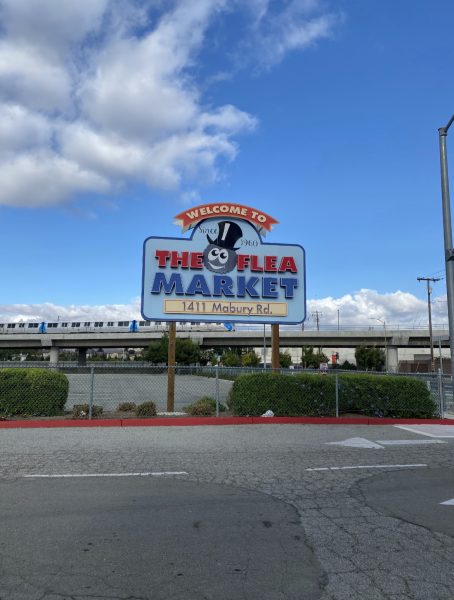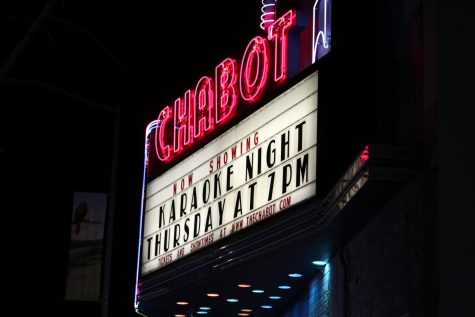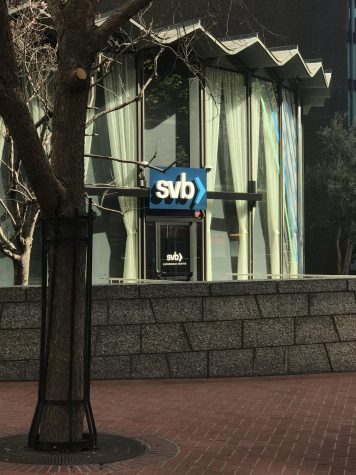BART Workers Share Stories at Oakland Rally
With the BART strike’s deadline only 72-hours away, several labor unions gathered in Frank Ogawa Plaza last Thursday to express their frustrations with the negotiation process and their dissatisfaction with salary and working conditions.
More than 400 people gathered to listen to dozens of speakers in downtown Oakland, including actor Danny Glover, famous for his role in the Lethal Weapon series and The Color Purple. Glover called the workers his “heroes” and noted there was a “smear campaign” against BART workers in the media.
“We want BART to negotiate on solid principle, and negotiate with [the unions], not attempt to get the public into this,” Glover said.
Members of BART’s three labor unions, AFSCME, ATU and SEIU, participated in the march, days before the midnight Aug. 5 deadline for negotiations approached. Some workers were careful not to share their full names with the press, because BART policy stipulates workers who speak to the media without getting permission from their supervisor are liable to lose their jobs.
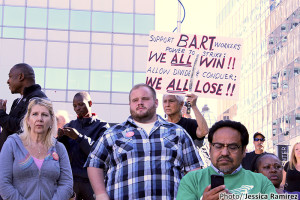
surrounding salary increases and worker safety.
Ted, a BART electrician and a member of the SEIU, has worked with BART for two years. Ted said that he enjoys his job, but believes BART workers don’t earn enough, and aren’t given sufficient protection on the job.
Ted says he works overtime to support his family, which takes time away from being home.
“Our families are growing,” said Ted. “We need extra income to sustain and to help with our family, or else, there’s more mouths to feed on a less income.”
As an electrician working in the transit tunnels, Ted highlighted safety concerns workers face changing light bulbs, inhaling toxic fumes and dealing with the noise of the trains. Workers are often not given proper warning of oncoming traffic, he said, and stated that BART should invest in developing better ventilation and warning systems inside of the tunnels.
“When a train comes in, you know at less [than] 10 seconds ahead,” he said. “We don’t have that luxury. We don’t. So you just have to trust your coworkers…all the five senses. You have to use them.”
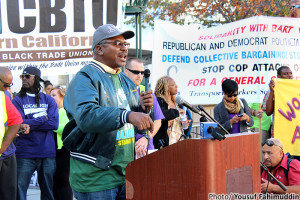
stage to speak in support of the BART workers.
Ted stated that workers will stay in the tunnels for up to eight hours at a time, fixing light bulbs and repairing wires. BART provides protective gear for its employees, including surgical masks, goggles and disposable earplugs, he said, but the masks do not filter out the dust and the noise has given him hearing problems.
“Every time the train passes through the dust recirculates,” he said. “When you work in there, by the time you come out, your nose — I mean you blow out all the metal dust. And BART just refuses to upgrade the system to make it cleaner and safer for everybody.”
The march, which was organized by BART’s three labor unions, drew in fellow unionists who felt compelled to show their solidarity with the BART unions and their side of the negotiations.
Many of them related with the issue of wage increases and the cost of living. Raquel Arcia, who took part in the march, said that as an employee at CSU East Bay and a member of the union CSUEU, she has not received a cost living wage increase in six years due to budget cuts.
“The cost of living has gone up tremendously in six years, and we haven’t been able to keep up with it,” Arcia said.
James Singh happened to be delivering a package when he was interrupted by the strike. He stood on the street corner and watched as the crowd with marching band in tow made their way to BART headquarters. Singh said that he sympathized with the mothers who work for BART and the struggle of maintaining a family.
“One mother told me she has to wake up at two o’clock in the morning to prepare things for her children, go out there catch some kinds of ride, then start work in San Francisco at seven in the morning. That’s just too rough,” Singh said.
“That was enough to convince me that the issues need to be negotiated,” Singh said.




